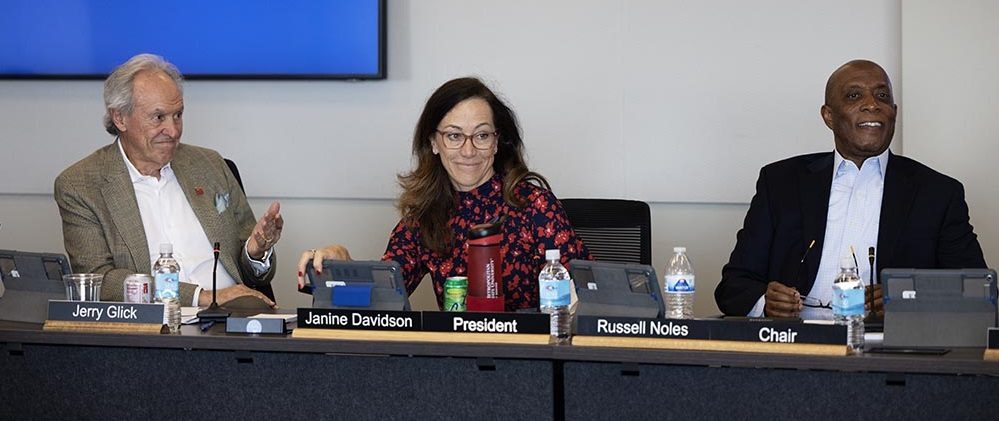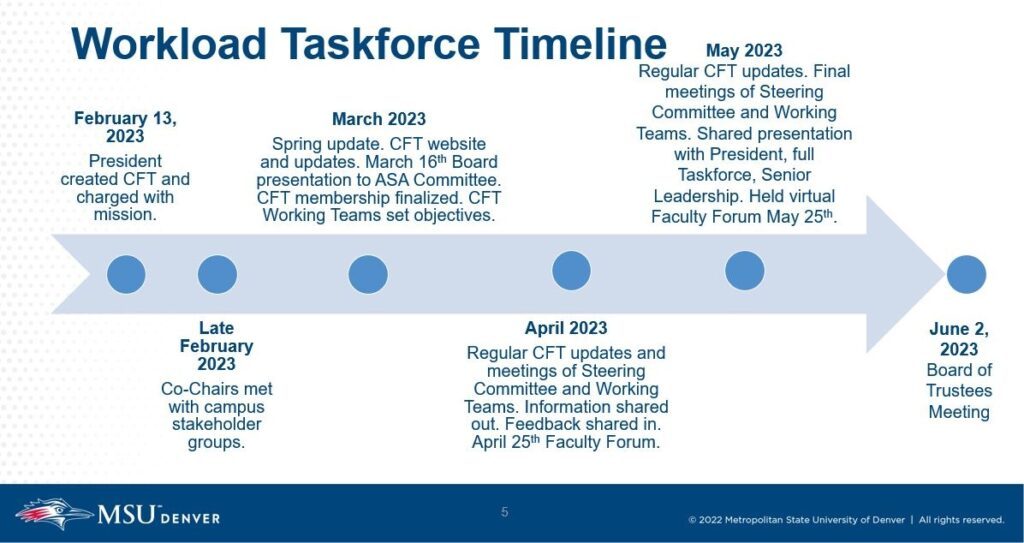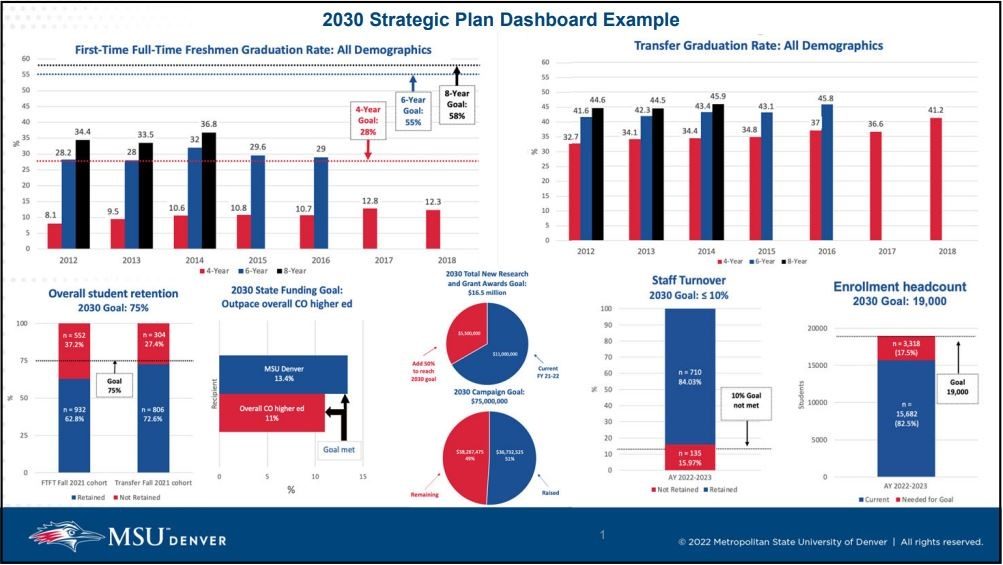 At the final board meeting of the 2022-23 academic year, Metropolitan State University of Denver’s Board of Trustees on Friday approved the Fiscal Year 2024 budget, including across-the-board 4% pay raises for faculty and non-classified staff members and a 5% increase in tuition and mandatory fees. With MSU Denver’s Tuition Lock Guarantee remaining in place, the tuition increase pertains only to new, incoming students beginning in fall 2023.
At the final board meeting of the 2022-23 academic year, Metropolitan State University of Denver’s Board of Trustees on Friday approved the Fiscal Year 2024 budget, including across-the-board 4% pay raises for faculty and non-classified staff members and a 5% increase in tuition and mandatory fees. With MSU Denver’s Tuition Lock Guarantee remaining in place, the tuition increase pertains only to new, incoming students beginning in fall 2023.
The budget also includes funding for critical maintenance and infrastructure investments such as roof repair and phone system replacement as well as the launch of the new College of Aerospace, Computing, Engineering and Design. Trustees also had a robust discussion regarding rebuilding reserves that have been depleted during the pandemic. President Janine Davidson, Ph.D., said it’s not a matter of if, but how quickly, those reserves need to be replenished.
The final budget is largely in line with the recent recommendations from the University Planning and Budget Advisory Council, with the notable adjustments in support of University priorities of investing in people and retention:
- The budget establishes a minimum employee salary of $41,626, in alignment with the minimum living wage for one working adult in Denver, as determined by the MIT Living Wage Calculator.
- If student retention exceeds projections, faculty members and non-classified employees could receive a one-time bonus of up to 1% of salary this fall. Beyond compensation, additional revenues generated by better-than-expected retention this coming year would be allocated to unexpected needs or to replenish reserve funds.
“This budget is strategic, inclusive and transparent, but most of all it’s focused on our most precious resource: our people.” said Davidson. “We’re putting our money where our mission is — and that remains students, students, students — by investing in the student-focused faculty and staff who serve them. Student retention is what fuels our flywheel and it goes hand-in-hand with compensation.”
Davidson will provide a full outline of the Fiscal Year 2024 budget to all employees in an email message later this week, and Jim Carpenter, chief financial officer, will further review during a University Budget Town Hall June 7 at 1 p.m. in the Jordan Student Success Building, room 400, or virtually here.
Faculty Workload
The Cross Functional Taskforce on Faculty Workload, led by Meredith Jeffers, Ph.D., faculty trustee, and Interim Provost Marie Mora, Ph.D., began by restating the original charge of the taskforce, which was to “provide options, including detailed budget modeling, to support the trustee’s decision-making.” Mora and Jeffers outlined the work completed during nine weeks of data-informed, collaborative work by more than 40 faculty members, staff members and students across campus. They highlighted recommendations made by the six working teams and feedback and input gathered from the campus community through different mechanisms, including two open faculty forums, as well as approaches to foster a sustainable, student-centered faculty workload.
Chief among the primary recommendations from the working teams were immediate, budget-neutral approaches to reduce inefficiencies and increase equity by moving uncompensated instructional activities into faculty workload or providing additional compensation, adjusting the distribution of teaching, reviewing class sizes and scheduling, and improving communication.
In addition to the immediate efforts to reduce inefficiencies, Mora presented an option for differentiating workloads among and within departments. While more granular college and department analyses are required, this model could help with rebalancing workloads as early as spring 2024.

Other approaches explored included:
- The previously proposed 3-3 teaching load for tenured/tenure-track faculty members and 4-4 teaching load for non-tenure-track faculty members, which was not deemed to be sustainable given the current budgetary reality
- A potential 4-3 teaching load for T/TT faculty and 5-4 teaching load for NTT faculty, the feasibility of which will hinge on longer-term budget modeling to commence later this summer as well as student enrollment and retention
- Teaching load credit guidelines, which could be implemented in fall 2023 to begin alleviating workload for faculty as early as spring 2024
Mora also iterated the need to address faculty compensation, which arose as a common theme throughout the taskforce’s work.
Mora emphasized that while options with potential major budget impacts will be evaluated through the revamped budget-planning process that will begin later this summer, the budget-neutral options can be addressed more immediately and implemented as early as spring 2024.
Next steps include publishing an interim executive summary report that will outline next steps for prioritizing, actioning and aligning recommendations with policies, procedures and relevant calendars, including for class scheduling and budgets. The cross-functional work will continue under the direction of the provost, who will assess progress and provide future updates to the Board of Trustee Academic and Student Affairs Committee and the campus community.
Mora will also immediately begin working closely with deans and department chairs to analyze the distribution of faculty workload, class sizes, and scheduling as well as to implement teaching load credits. The Office of Faculty Affairs will begin developing the data-collection infrastructure for faculty workload dashboards to improve transparency of workload at all levels.
“No one at this University should have an unsustainable workload, and there is a teaching workload imbalance,” said Davidson. “This imbalance was not created overnight, and it’s not something that’s going to be fixed in a sustainable way overnight. If we want the solutions to be real, enduring and sustainable then they need to be embedded into the mainstream University processes that exist for building budgets and refining academic policies and guidelines.”
The CFT revealed that the pain points vary across the enterprise. In response, Davidson said that over the summer she would work with the interim provost, deans and chairs to gain a more granular understanding of where the imbalances and opportunities are.
Board of Trustees Chair Russell Noles thanked the members of the CFT and praised the leadership of co-chairs Mora and Jeffers. He noted the taskforce has established a deeper understanding of the facts, the cross-functional way of working together toward solutions should continue and the Board looks forward to tracking the progress.
Student success launch strategy and data dashboard
In Thursday’s Academic and Student Affairs Committee meeting, Mora, Will Simpkins, Ed.D., vice president for Student Affairs, and James Mejía, chief strategy officer, presented the University’s cross-functional, collaborative, data-informed approach to strategic planning and student success, including unveiling new data dashboards.
The Strategic Plan and Student Success dashboards feature specific metrics on graduation rates, retention, enrollment, staff turnover, grants and fundraising. Initial undergraduate student success data analysis demonstrates that first-semester GPA is a leading indicator for retention and ultimately degree completion.
A corresponding update on “Stuff that Works” programs that result in high retention rates among undergraduate students with net financial gains, demonstrated particularly strong return on investment for Pathways to Possible, Concurrent Enrollment and Deans Grants for at-risk students.
Davidson noted how the various streams of effort around the Strategic Plan, the cross-functional taskforce on faculty workload and targeted retention/STW efforts, dubbed launching student success, are mutually supporting and overlapping. Together, they inform the university’s final phase of post-pandemic recovery, (Recover, Stabilize) LAUNCH! that was outlined in the fall 2022 Welcome Back event.

WATCH FULL MEETING HERE for additional updates from the state legislature, new campus infrastructure proposal and new School of Hospitality programs.
Additional Highlights:
- A Government Affairs and state legislative update highlighted outcomes and reflections from the recent state legislative session including:
- 11% total increase in higher education funding, including a 13% increase for MSU Denver
- $1.8 million for campus IT projects
- No state funds for Health Institute Tower or Classroom to Career Hub this year
- Need to:
- Continue to educate the legislature on MSU Denver’s mission and role
- Strategically align with other institutes of higher education
- Further align priorities with state’s workforce development strategy
- An infrastructure briefing highlighted an AHEC proposal for mixed-use development on the campus’ Ballfield lot next to the Tivoli Parking Garage. The proposal includes a five-story office building, which would house MSU Denver’s C2 Hub as well as a separate building that would offer affordable housing options for faculty and staff members at no cost to the University. Details and funding are in development, but the project timeline aims to begin construction in spring 2024.
- Erica Buckland Anderson, director of Curriculum and Catalog, presented five new programs for approval. The programs, all in the School of Hospitality, address gaps in the marketplace, offer intentional stacking and were approved for implementation in fall 2023:
- Bar, Tap, and Tasting Room Manager Certificate
- Beverage Scholar Certificate
- Cannabis Hospitality Manager Certificate
- Cannabis Hospitality Specialist Certificate
- Culinary Arts Certificate
- Twelve faculty members were approved for emeritus status
- Loretta Chavez
- Sandra Doe
- Clark Dollard
- Joan L. Foster
- David “Lynn” Hoffman
- Rich Kessel
- John “Jackson” Lamb
- Stephen Leonard
- Karen Lollar
- Jan Perry Evenstad
- Zoe “Rae” Shevalier
- Xiansheng Tian
- Internal audit results on IT Asset Management Leasing Process and University Advancement Pledge & Planned Gift Process were shared by Amanda Jo Erven, director of Internal Audit Education.
- Friday marked the last meeting for Student Trustee Gabe Trujillo and first for newly elected Student Trustee Michael Warner, a junior accounting major.

